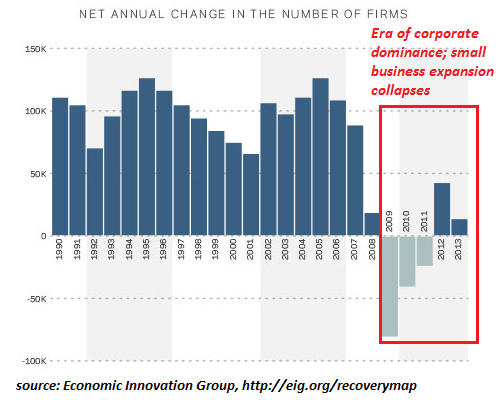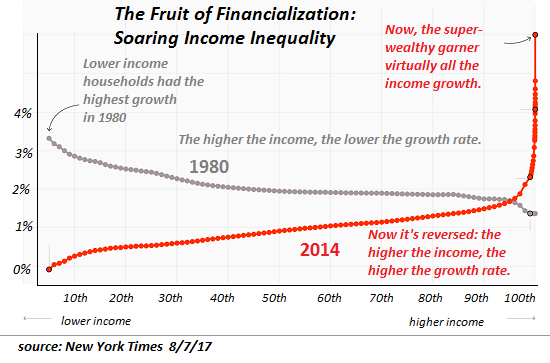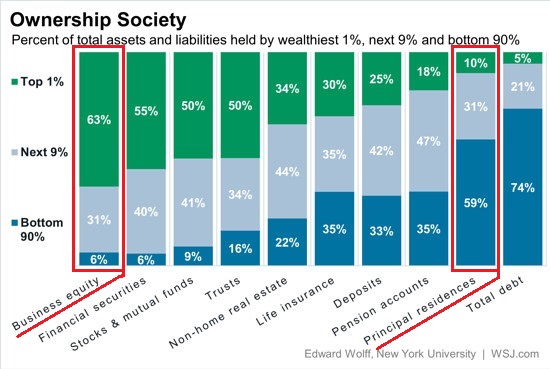Democracy (i.e. political influence) and ownership of productive assets are the exclusive domains of the New Aristocracy.
I have often used the words neoliberal, neocolonial and neofeudal to describe our socio-economic-political status quo. Here are my shorthand descriptions of each term:
1. Neoliberal: the commoditization / financialization of every asset, input (such as labor) and output of the economy; the privatization of the public commons, and the maximizing of private profits while costs and losses are socialized, i.e. transferred to the taxpayers.
2. Neocolonial: the exploitation of the domestic populace using the same debt-servitude model used to subjugate, control and extract profits from overseas populations.
3. Neofeudal: the indenturing of the workforce via debt and financial repression to a new Aristocracy; the disempowerment of the workforce into powerless debt-serfs.
Neofeudalism is a subtle control structure that is invisible to those who buy into the Mainstream Media portrayal of our society and economy. This portrayal includes an apparent contradiction: America is a meritocracy–the best and brightest rise to the top, if they have pluck and work hard– and America is all about identity politics: whomever doesn’t make it is a victim of bias.
Both narratives neatly ignore the neofeudal structure which disempowers the workforce in the public sphere and limits the opportunities to build capital outside the control of the state-corporate duopoly.
The book The Inheritance of Rome: Illuminating the Dark Ages 400-1000 shed some light on the transition to a feudal society and economy. While the author is a fine writer, the subject matter doesn’t lend itself to light reading. The transition from the Roman legacy of centralized governance (empire, monarchy, theocracy, etc.) to feudalism (governance by local lords / aristocracy) was complex and uneven, and the author takes pains to describe the process and many variations that arose in a highly fragmented post-Roman Europe.
(Note that the Eastern Roman Empire, a.k.a. Byzantine Empire, endured until 1453 AD. I’ve written often on both the western and eastern Roman empires: The “Secret Sauce” of the Byzantine Empire: Stable Currency, Social Mobility (September 1, 2016)
Don’t Diss the Dark Ages (October 26, 2016)
In the Footsteps of Rome: Is Renewal Possible? (July 24, 2017)
Neofeudalism is not a re-run of feudalism. It’s a new and improved, state-corporate version of indentured servitude. The process of devolving from central political power to feudalism required the erosion of peasants’ rights to own productive assets, which in an agrarian economy meant ownership of land.
Ownership of land was replaced with various obligations to the local feudal lord or monastery–free labor for time periods ranging from a few days to months; a share of one’s grain harvest, and so on.
The other key dynamic of feudalism was the removal of the peasantry from the public sphere. In the pre-feudal era (for example, the reign of Charlemagne), peasants could still attend public councils and make their voices heard, and there was a rough system of justice in which peasants could petition authorities for redress.
Of course peasants usually lost to the aristocracy and monasteries, but at least the avenue of redress was at least partially open. This presence in the public sphere was slammed shut in feudalism.
From the capitalist perspective, feudalism restricted serfs’ access to cash markets where they could sell their labor or harvests. The key feature of capitalism isn’t just markets– it’s unrestricted ownership of productive assets–land, tools, workshops, and the social capital of skills, networks, trading associations, guilds, etc.
Our system is Neofeudal because the non-elites have no real voice in the public sphere, and ownership of productive capital is indirectly suppressed by the state-corporate duopoly. Various studies have found that politicians ignore the bottom 99.5% who don’t contribute to their campaigns or crony-capitalist wealth (five quick speeches for $200,000 each is $1 million. Rinse and repeat.)
The vast majority of incumbents are re-elected, as they leverage their power to vacuum up enormous sums of campaign contributions that then buy the compliance of a cowed public.
As for ownership of assets— small business startups have been crushed by soaring costs, heavy regulations and the dominance of cartels and quasi-monopolies enforced by the state.

Income growth is now the exclusive domain of the Financial Aristocracy:

The so-called middle class owns little to no productive capital; what it “owns” is a house, which is ultimately a form of consumption. I say “owns” for two reasons: one, most households have a mortgage, so their ownership is still contingent on making monthly payments to a lender, and two, the government collects property taxes on the home regardless of the owner’s income or ability to pay.
Compare this to taxes levied on business income: if the business has no net income, it owes no taxes. Not so with property taxes–they are the modern equivalent of “rent” paid to the feudal lord.
Note that the aristocracy owns productive assets while the serfs own housing and debt. This is not a flaw in the system, it’s a feature of the system.

Democracy (i.e. political influence) and ownership of productive assets are the exclusive domains of the New Aristocracy. This is Neofeudalism in a nutshell.
“Under a scientific dictator education will really work — with the result that most men and women will grow up to love their servitude and will never dream of revolution.”
“The nature of psychological compulsion is such that those who act under constraint remain under the impression that they are acting on their own initiative. The victim of mind-manipulation does not know that he is a victim. To him, the walls of his prison are invisible, and he believes himself to be free. That he is not free is apparent only to other people. His servitude is strictly objective.”
Aldous Huxley
video interview of Aldous Huxley
source of quotes (read the entire thread)
If you found value in this content, please join me in seeking solutions by becoming a $1/month patron of my work via patreon.com.
Check out both of my new books, Inequality and the Collapse of Privilege($3.95 Kindle, $8.95 print) and Why Our Status Quo Failed and Is Beyond Reform($3.95 Kindle, $8.95 print, $5.95 audiobook) For more, please visit the OTM essentials website.
Source Article from http://feedproxy.google.com/~r/blacklistednews/hKxa/~3/nUUnS_cfsEI/M.html
Related posts:
Views: 0
 RSS Feed
RSS Feed

















 September 21st, 2017
September 21st, 2017  Awake Goy
Awake Goy  Posted in
Posted in  Tags:
Tags: 
















